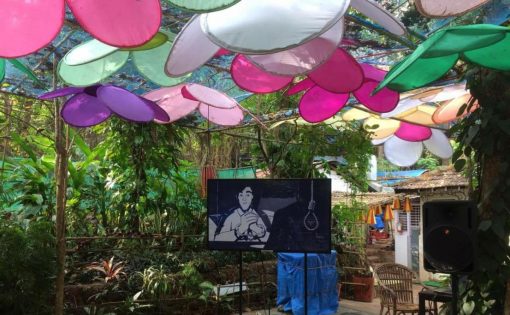
Cinema is an important tool in fighting the forces of fascism and regression that have expanded their base across India. This has been proved very effectively by film activist Sanjay Joshi and his associates, who have been taking meaningful cinema to corners of the country under their initiative ‘Cinema of Resistance’ or ‘Pratirodh ka Cinema’ for over a decade.
In an era of shrinking democratic space, with the scientific temperament a major casualty, this cinema movement too has faced new challenges. Nevertheless the caravan has moved ahead with support from intellectuals, activists and people who refuse to cow down to those trying to divide people and debase them.
“Our challenges have increased. The middle class that used to come to these screenings is now reluctant to do so, fearing that there might be trouble coming from the right wing at these events. At times, like in Udaipur, we were compelled to change our venue,” Joshi shared with The Citizen.
“But then we have also changed our strategy. Our focus has been on distributing maximum material right up to the mohalla (neighbourhood) level, and encouraging residential societies to have their own screenings,” he said.
Today Joshi is part of a pan-Indian network of film lovers and activists who act as resource persons organising film screenings across the country. The films they screen range from masterpieces like Bicycle Thieves, Zoo and Garam Hawa to a whole range of documentaries on relevant subjects, whether local, regional or international.
Coming from Allahabad in Uttar Pradesh, Joshi has been instrumental in organising periodic film festivals at places like Gorakhpur, Barmer, Nagpur, Azamgarh, Udaipur and Nainital.
So far he has organised 69 such festivals over the last 13 years introducing meaningful cinema to the people, free of cost.
“It brings huge satisfaction when people walk up to you and say, ‘I never knew cinema aisa bhi hota hai (can be like this).’ We have been having these festivals with the bare minimum of equipment that we collect from donors. Even things like a black sheet of cloth are of extreme importance to us: it helps darken the hall for the screening,” he said.
As a part of the renewed strategy to encourage people to organise their own film clubs and societies, Joshi goes with his associates to these places to help them organise.
In the process he hands them around 150 to 200 films that they can screen through the year.
The most interesting example is a new initiative by the name of ‘Bi-scopewala’, which has picked up in Delhi and adjoining areas. It targets children and introduces them to the values that will make them progressive in their outlook.
The core condition Joshi imposes on such festivals is that they should not be funded by the corporates. “How can you show films questioning their role in society when you have taken monetary assistance from them? How can you raise questions against the development models being imposed on people in such a scenario?
“It is better to take advertisements from small shopkeepers for the brochures and souvenirs to fund these festivals. It helps build the local connect, and people do not mind giving advertisements that help them sustain their livelihood through their small enterprises. It is also good to raise resources through donations,” Joshi said.
Challenges do not come in the form of aggression from the forces of hate alone. There are logistical problems as well. “We have to see which session is apt for screenings for children. We have learnt from experience that getting a large number of them to come for Sunday screenings is difficult.
“Also, approaching households to send their children consumes a lot of energy. So we approach the audience of children through schools, as approaching the authorities at one school is far easier than approaching 200 households,” Joshi said.
Then it has to be kept in mind what kind of films are to be screened after the session for the children, who do not leave the venue immediately after as they have traveled long distances to get there.
“Recently we were asked to organise a festival for special children, including those who could not see, hear or speak, besides other disabilities. Selecting films for them was a very big challenge,” he recounted.
It is also a challenge to introduce the audience, particularly children, to the issues and cultures of people of an altogether different region on whom documentaries have been made. For example, sensitising children from hilly regions like Almora to the apparel, language and music of tribal Orissa takes a lot of effort.
These film festivals have also become platforms to release new documentaries, short and feature films away from the glare of Bollywood and commercial media.
The releases are always marked by meaningful discussions and formulation strategies on how to take the people’s movement forward.
One such film, Subrat Kumar Sahu’s The Mountains Agonized (Ho gayi hai pir parbat si) was recently released at a three day film festival and workshop held at the Sambhaavnaa Institute for Public Policy and Politics at Kandbari, Kangra, Himachal Pradesh.
The film explores the impacts of hydel power development in the Satluj valley. It captures visuals and resident testimonies of the deleterious effects of the many ongoing hydro power projects on the local farm-based economies, and on their precious water sources, causing deforestation, health hazards, landslides, flash floods, leading to desperate situations for the communities and threatening to drive them into dispossession and perpetual deprivation.
According to Joshi, the objective of Pratirodh ka Cinema is “to work as an interactive and non-profiting agency of communication between people and cinema by representing the real issues of people, as opposed to the contemporary mainstream media and cinemas.”




